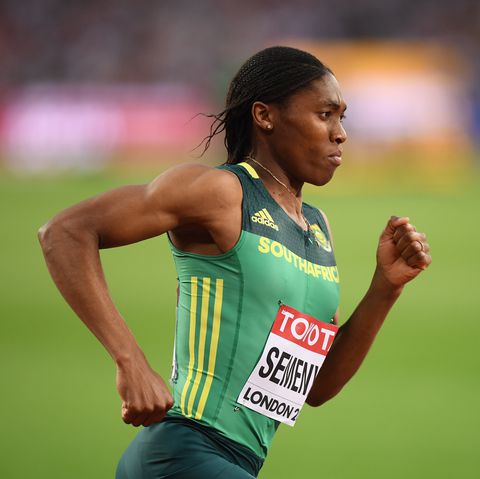Since 2009 when she won the 800m dash during the World Championships in Berlin, Germany with a time of 1:55.45, Caster Semenya has been a topic of discussion. Yet rather than lauding her tremendous speed and achievements, she has been ridiculed by fellow competitors, hounded by sports governing bodies, and is now being asked to medically alter her body. Since winning the Diamond League meet in Doha, Qatar with the fourth fastest time of her career, 1:54.98 the IAAF has decided that women in general, and Semenya in particular, who want to compete in races longer than 400m must have testosterone below a certain level in order to fit into an arbitrary category of womanhood. That is, after all, what it comes down to in the end—who is woman enough to run? This is the question that has been asked of Semenya since she was 18 years old in 2009, continuing until now that she is 28. It is hard to ignore how close to the center of this debate over true womanhood that Semenya has played, and thus it is difficult to ignore the intersections of both race and gender in making such determinations. As I (and many others) have written time, and time again, black women in sport have often been the sites of discussions about true womanhood, on and off the field.
Muscular bodies are read as masculine bodies, and masculine bodies are read as male—thereby placing black women in particular beyond what is imagined as true womanhood. For Semenya this has led to other athletes complaining about running along-side her (as if they could catch her) and making comments such as ‘Just look at her … these kinds of people should not run with us. For me, she’s not a woman. She’s a man’ (Clarey and Kolata 2009). The black woman in sport is often subject to the same stereotypes associated with black men—hypermasculine, hypersexual, and animalistic to name a few. Which in turn leads to black women being read by others as “mannish amazons” who have no place on the field with “real women.” These racist and sexist sentiments are a reflection of the power of Misogynoir within our society—Misogynoir being the that form of hatred of girls and women that is directed specifically at black women.
Caster Semenya is an athlete beyond measure, one whose sporting presence causes anxiety in those who cannot hope to accomplish what she does naturally. So, in order to placate the norms and standards that are often based on faulty premises (i.e. testosterone implies an athletic advantage) women like Semenya have to suppress their natural abilities if the wish to continue competing on the stages in which they excel. I have watched and written about Semenya since 2011 and believe that a world that would ban her from doing what she does best, the best, is not world that I want to participate in. However, it is unfortunately the world in which we live. Athletes like Semenya, Serena Williams, and more are often scrutinized for their superior talents, as well as their black womanhood, and it is unfortunate that cannot regale us their supreme talents in peace. Misogynoir is real, and it is powerful, and blinding. Black women are women beyond measure, and should be allowed to compete as such.


 NFL
NFL





